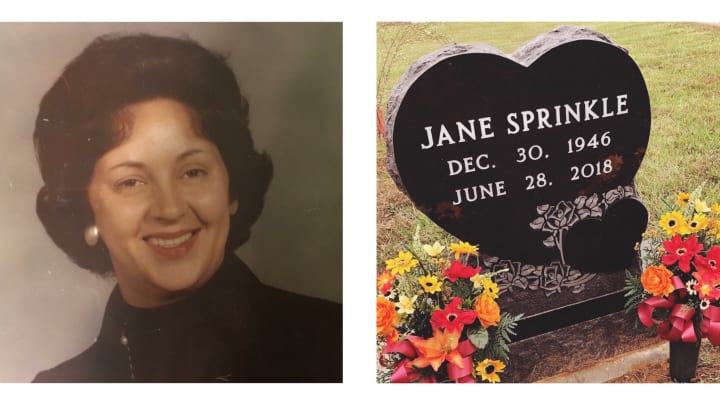
“An oxygen mask will automatically appear in front of you. Place the mask firmly over your nose and mouth…” I had one headphone in, my face turned to look out the window while the flight attendant continued, “…secure the elastic band behind your head…” and breathe normally, I thought along with her. “If you are traveling with a child or someone who requires assistance, secure your mask on first, and then assist the other person.”
I’d been on enough airplanes to know her spiel by heart and was inattentive to both her and the music playing through a single earbud. It was a Saturday, 5 PM, and precisely two days, four hours and thirty-two minutes before, Dad texted to let me know Grandma was gone.
I stuck my second headphone in despite the flight attendant not being finished with the procedures and closed my eyes. Whatever lyrics filtered through did nothing to distract me from the reason for this impromptu journey. This was not her first battle with lung cancer; it was just the winning round. Her sickness was a war she had fought for nearly 15 years until her body and mind began to fail her.
People always say that the dying sound different, that they are a kind of tired you just don’t understand. I remembered her shaky voice asking, “Are you Jeff’s girl?” over the phone. It sounded impossibly fragile, difficult to hear, and not just because she was so soft-spoken.
She didn’t know who I was at first. The thought stuck in my throat, hard and painful to swallow back down. The plane jostled me in my seat as we took off from Houston, and I struggled to swallow the lump.
“I love you, you and your brother. I’ve always loved you…” I’d been on my way home from work when I was finally able to get her on the phone, but it was a good thing I’d already parked my car, because I could no longer see through the thick veil of my tears. Her words sounded like she was fighting to get them out.
“I know, Grandma, we love you too, so, so much.” I tried to keep my tears out of my voice, tried to be strong and put-together, but my heart was breaking at the words she said to me and the words she would never say again. I choked on my own goodbyes.
The plane leveled out and I squeezed my fist, digging my nails into my palms, the pain of my skin breaking distracting me from the pain of my loss. The ride would only be two hours and I couldn’t afford to let myself dwell on my own sadness. If I thought about what I was feeling, I would never make it through the weekend, and I needed to prepare myself for what was to come. So, I sat in my seat with my eyes closed, packing my grandmother away in a box.
Her funeral was the next morning, a Sunday, the first of July. A holy day, though it seemed anything but. I stood at the back of the room and watched people slowly make their way towards the front. The faint sounds of weeping emanated from every corner, anguish that was not my own shoving at my heart and mind, crowding me though the room was by no means full. I hugged my arms and did not join their steady flow. I tried to separate myself from their overwhelming sorrow. Eventually, my father’s hand landed on my shoulder. Despite its weight—the callouses from years of hard work and guitar strings—it was trembling.
“Do you want to see her?” he asked me softly.
I stiffly nodded, tears already springing to my eyes before I’d even taken a step, terrified of his simple question. This is what people did at funerals. I could do this, I could play this game. I was fine. He mistook my tears for sadness and I let him, because the alternative was not an option for the fragile man standing next to me. He could not know my discomfort, that the last thing I wanted to do was stand in front of a casket that held my grandmother. He could not know how much I did not even want to be there.
I’d tried to reason with my mom the day Grandma died, as she frantically bought plane tickets. We lived in Texas and snagging a last-minute plane ride to Indiana was not easy. She was too impatient and frazzled to comprehend the true reason for my reluctance in going to her funeral.
“I need to know: Are you going or not?” she’d asked sharply.
“I don’t know that I can,” I tried to explain. “I have work Monday morning, and if the funeral is on Sunday, I would have to be at the airport immediately after, if there was even a flight available!” I did not have the words just yet to describe how this would be a very difficult thing for me to experience, not simply because funerals made me uncomfortable in general and had never been helpful to me in my grieving process. How could she understand my bone-deep aversion to funerals, not because of the dead, but because of the living? How could she understand something she had never gone through herself?
“Your father really wants you to be there—he needs you to be there.” I could not keep arguing with her, and my boss had overheard my conversation and offered her condolences, as well as Monday off.
So, I went anyway.
When he picked us up from the airport, Dad told of her passing.
“We’d only been gone for thirty minutes,” he said, as if he still didn’t believe it himself. He, his brother, and their father had gone out to get a sandwich and come right back. Instantly, they knew something was off. The house was completely silent, peaceful, even. There was no labored breathing, no coughing or moaning.
Grandpa had gone to her side. “Sweetheart,” he said, already crying. He always called her that. “Jane?” His hand was on her shoulder. “Sweetheart, come back, come back to me, come back.” He shook her with increasing violence.
My dad, crying behind the wheel, admitted, “I’ve never seen him cry like that before.”
I imagined Grandpa’s wounded voice, Grandma’s sickly, sunken in, ragdoll body floundering on the hospice bed they’d put in the living room, his pleas getting louder and louder in my mind until they coated my spine with needles of ice. I gasped, physically pained, and blinked back my tears so hard I saw stars behind my eyelids.
I had tried to prepare myself for the strong emotions I would be feeling from my family at this funeral, but nothing could have truly prepared me for the way my father whimpered like a child, or for the way he kept his hand on my shoulder like I was steadying him as we walked up to her casket.
I stood next to my grandpa, my aunt, and uncle, and I said goodbye. And then I fled.
I left the building as fast as I could, fighting against the panic rising in me, the desperate urge to slip off my heels and run barefoot on the hot asphalt roads of Milltown Indiana that I had never needed a map to know. Relief was waiting for me down the road, away from all these people and their emotions that bruised me like a battering ram, but it was just out of reach. I couldn’t leave. Another hour remained, and it loomed in front of me like an eternity.
I braced my hands on my knees, pushed back my tears, took several deep breaths, and stood straight just as my brother joined me outside. He did not pat me, hug me, or ask if I was okay. Instead, we stood side-by-side in the surprisingly wet heat of the beginning of July in companionable silence until he asked me if I was ready to go back in. I said yes, not because I was, but because I felt I had to be.
“Your father needs you to be there,” Mom had told me, unaware of how the words would prompt me to set aside my own mourning process to endure his. He needed his daughter, arguably the most empathetic in the family, to help guide him through the weight of his grief.
But he did not understand the repercussions. Dad, so blinded by his grief, couldn’t see that the only way I could shoulder his was to set aside my own. Nearly the entirety of the funeral I spent tense and tight-lipped. I knew of no happy medium to be. I did not feel able to experience my own grief when everyone else’s was such a present factor. While I knew it was necessary for me to pack away my own emotions, I felt terrible for being so cold and impartial. My own guilt dragged me down just as much as everyone else’s pain. I spoke to barely anyone and kept my eyes from the front of the room, but I could not avoid passing by her body every time I freshened my face in the restroom.
By the third time I passed by her, I felt under control. Each time was easier and easier to be near, though I still avoided looking at her face. Instead, I studied the rich, polished brown of her casket, the throw blanket someone had gifted draped over the closed half, the flowers that flanked her.
A specific basket held my attention. My grandparent’s anniversary would have been the following week. They would have been married 55 years, an astounding number to me, and heartbreaking that it was cut short just before the date. In honor of those years, there was a basket of 55, gorgeously plump, Pink Fancy carnations. I touched their petals delicately, and a warm memory seeped into my mind.
It was 2011. I had just graduated High School and was spending the summer with my grandparents. Next to their home was a small shed in which my grandmother ran her business. Though small, Sprinkle’s Flower Shop was one of the most popular in English, Indiana. Grandma used to joke about how funerals were her best business, even though many of the people dying were people she knew. I didn’t find it as funny, standing at hers.
The first lesson she ever taught me was with a fresh box of Pink Fancy carnations. “Just take the leaves off the stem and any petals you see that look bad,” she demonstrated to a petal with a torn, brown edge. Though she had no formal training, she knew exactly what needed to be done to make the flower pristine. Gripping the petal close to where it connected with the base of the flower, she peeled carefully down, ensuring the entire petal came off rather than ripping half in a hurry.
She only showed me the one flower and let me finish the box on my own. The memory of her pride in me when I did them all correctly, and how we celebrated such a small, seemingly insignificant victory by going out for ice-cream was as soft as the petals under my fingers, and it lasted for hours after the funeral was over.
We left home for Texas early Monday morning. Altogether, the trip was so speedy, so sudden that it barely seemed real at all. How could all of that happen so fast? So much had been packed into a single weekend. Still, I had no time to relax as I had to be at work the next morning at 6:45 AM. I tried to pick up my journal and write out my emotions, but all I was able to get out was the date and time of her death, as impartial as a doctor must be when they lose a patient, before closing the book and putting it away. My emotions would take time and energy to analyze—time and energy I did not feel I had, so I kept shoving the lid down to close it as one does with an overflowing suitcase that desperately needs to be zipped.
A month went by. I had longer shifts because we were short-staffed at work. I had chores when I got home. I was sick on and off for a week. Two months. I walked around in a haze, “I’m fine” my ready answer when anyone asked how I was doing. My grandfather’s posts on Facebook on the monthly anniversaries of her death all said similar things. “Lost my wife last week. Today would have been our 55th wedding anniversary.” “Missing my sweetheart.” “Good days and bad days ahead, I know.” He changed his profile picture weekly to a new photo of them together or her alone. At this point, I was exhausted and couldn’t bear to think about what had happened. I had excuse after excuse prepared for why I couldn’t think about Grandma, her funeral, or how it had affected me. My emotions were volatile and fragile all at once and escaped in uncontrollable bursts that I could never predict. A stray thought of her name or a memory left me broken and crying, and it was harder and harder to get myself and my emotions under control. They wanted to be let out and they wanted to be taken care of, but I didn’t know how.
In 1992, a phenomenon was introduced to the nursing community called “compassion fatigue” and expanded a few years later to rehabilitation caregivers, renamed “empathy fatigue.” It describes any caregiver experiencing an acute reaction of physical, emotional, and mental exhaustion brought about by extended close contact with those in their care that were suffering. Among these professionals, the symptoms largely go unrecognized, but ignoring or denying their existence causes even worse problems. The purpose of being a caregiver, to work with those who experience illness, loss, grief, and trauma, is rendered moot when all they can do is respond with less compassion and ingenuity.
Much like these caregivers, though I have never professionally been one, I was burnt out. I couldn’t handle the onslaught of emotion at the funeral and once getting home, I never took the time to heal from those wounds. Though I was no longer around those who’d be grieving so strongly, my own emotions were still bubbling inside like a pot on the brink of boiling over. I didn’t know what direction to take to help myself, so nothing happened. I had no energy to nurse my infection, and so I went untreated.
It wasn’t until the third month had passed that I was presented with an opportunity to discuss what I had gone through—what I was still going through. In one of my college courses, I was invited to write about anything if it was non-fiction and in a category of that genre. Instantly, my grandmother’s funeral popped into my head. I knew, intrinsically, that this was exactly what I needed to write about, though I had never written anything like this outside of my diary, and I struggled with how to begin.
In classic Miranda fashion, when I panicked about not knowing how to do something, I ignored it or found something else to do instead. I didn’t know how to think about my grandmother, so I focused on school. I didn’t know how to get started on my assignment, so I refused to think about it. I wanted to lose myself, so I did what I always do: I picked up a book.
It wasn’t a usual choice for me. I’d bought the book during a crazy sale—the kind I couldn’t pass up, even though it was a book I knew nothing about and nonfiction to boot; something I typically didn’t read in my free time. I shrugged as I turned to the first page of Cheryl Strayed’s Wild: From Lost to Found on the Pacific Crest Trail.
Like with any well-written book, I was entranced by her prologue’s comical account of losing one hiking boot down the side of a mountain, and hurling the other after it, because what was one boot without the other boot? How was I to know that this book would not just be filled with beautifully depicted scenery or amusing anecdotes from her hike? How was I to know that the book would not only take me on the hike with her, but it would show me the reason for the hike? How was I to know that Cheryl Strayed’s journey was rooted exactly where mine was? Chapter One took my heart and squeezed when Cheryl’s journey began precisely four years, seven months, and three days before deciding to hike, when she’d learned that her mother was going to die.
It was as if the universe was lining up all the materials I needed to face my own journey with grief. Suddenly, this was not a book that was a mere distraction from things I couldn’t, or wouldn’t, think about. It had been sitting on my shelf for two years until the moment I decided to give it a chance. At that moment, I felt as if the book was written specifically for me because it was specifically what I needed to read.
Our experiences weren’t quite the same; Cheryl lost her mother, and I lost my grandmother, but what each of us felt, the numbness, the way we seemed to be okay on the surface… That was the same. I devoured the book in two days, fervently flipping pages, my own tears blurring my vision as I read about her helplessness and self-destruction that matched my own. I witnessed the magic of the trail alongside her, the unexpected and sweet happenings, the sacred power of the landscape that surrounded her, the peace of Crater Lake and what a mountain and a wasteland and an empty bowl turned into after the healing began. She states once her 1,100-mile hike was completed that it felt like she had “carried [her mother] so long, staggering beneath her weight” (Strayed 306).
Usually, when I finish a book, I will feel some sort of relief, especially when I become so invested. This was different. The end of Wild left me breathless. I couldn’t understand how a single book had facilitated in my healing so stealthily, that it felt like something inside of me released as I closed it. A weight had been lifted. I studied the front cover, bewildered at how capable I felt, at how many times I had replaced Cheryl’s mother with my grandmother and had not once felt the urge to close the book. I was exhausted with the journey that book had taken me on.
At the end of every journey comes the task of unpacking. It was time for me to unpack my grandmother. Now, I knew how to talk about her and how I felt, how I was affected. Now, I knew how to start my assignment. I opened a word document and the things I had struggled to think about flowed out of my fingertips like the breaths I could now easily take.
My confusion about my assignment was the first step to my healing, though I did not know it. The time I took reading what I thought would only be a distraction gifted me with the time I kept telling myself I didn’t have to examine the effects my rejection of my feelings had on me. I never turned to drugs or infidelity as a way of coping with my grief like Cheryl, but my blatant refusal to vent, to lean on anyone or even admit that I wasn’t okay was damaging in a different kind of way. If the fatigue I had experienced was something that needed to be treated in professionals, how could I expect to keep going when I was denying myself that same care? I was trying so hard to help my dad through this unimaginable time before making sure I was able to help at all. Like the flight attendant said: I had to put on my own oxygen mask before assisting others.
It isn’t a completed process; I don’t know that it will ever truly be complete. But where once there was a deep wound, now there is only a scab. I know it will scar, but that’s okay. All that means is that I get to carry my grandmother with me, always.

About the Creator
M.G. Sprinkle
Aspiring author, killer of houseplants.






Comments
There are no comments for this story
Be the first to respond and start the conversation.